L’ajout d’un bouton Facebook Like à votre site WordPress est un excellent moyen de stimuler l’engagement et d’augmenter votre abonné aux réseaux sociaux. Il encourage les internautes à interagir avec votre contenu et à le partager avec leurs réseaux. D’après notre expérience, cela peut vous aider à atteindre un public plus large.
Cependant, le définir peut s’avérer délicat si vous n’êtes pas familier avec le codage. Même si vous essayez, vous risquez de rencontrer des problèmes de compatibilité avec votre thème ou vos extensions.
Pour faciliter les choses, nous vous recommandons d’utiliser une extension. Après avoir testé plusieurs options, Like & Share et WPCode de BestWebSoft se sont imposés comme d’excellents choix. Les deux simplifient le processus et vous aident à éviter les maux de tête de codage ou les problèmes de compatibilité potentiels.
Nous faisons également confiance à WPCode sur les sites de nos propres marques, car il s’agit d’une extension fiable et facile à utiliser pour ajouter des fonctionnalités personnalisées.
Dans cet article, nous allons vous afficher comment ajouter un bouton Facebook Like sur WordPress, étape par étape.
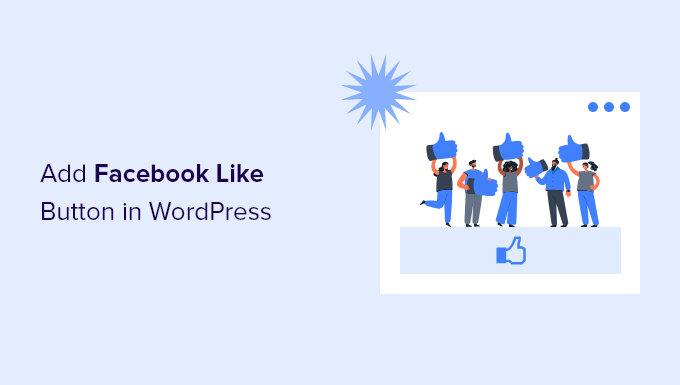
Pourquoi ajouter un bouton “J’aime” dans WordPress ?
Facebook est l’une des plateformes de réseaux sociaux les plus populaires au monde. De nombreuses entreprises utilisent Facebook pour entrer en contact avec leurs clients/clientes et promouvoir leurs produits.
L’ajout d’un bouton ” J’aime ” de Facebook à votre site WordPress peut aider à augmenter l’engagement des internautes. Il encourage également les gens à partager votre contenu sur leurs profils Facebook et à attirer de nouvelles utilisatrices/utilisateurs sur votre site.
Vous pouvez utiliser le bouton “J’aime” de Facebook pour augmenter le nombre de vos abonnés et créer une Version. Il aide à faire connaître vos produits et services et à stimuler les conversions.
Avec cela à l’esprit, nous allons vous afficher comment ajouter un bouton Facebook Like à votre site WordPress. Voici un aperçu rapide des méthodes que nous allons aborder dans ce guide :
Vous êtes prêt ? Voyons comment ajouter un bouton Facebook Like dans WordPress à l’aide d’une extension ou d’un code personnalisé.
Méthode 1 : Ajouter un bouton “J’aime” de Facebook dans WordPress à l’aide d’une extension
Dans cette méthode, nous utiliserons une extension WordPress pour ajouter un bouton ” J’aime ” sur Facebook. Cette méthode est très facile et recommandée pour les débutants.
La première chose à faire est d’installer et d’activer l’extension Like & Share de BestWebSoft. Pour plus de détails, consultez notre guide étape par étape sur l’installation d’une extension WordPress.
Une fois activé, vous pouvez vous rendre dans la section “Like & Share” “Réglages” de votre panneau d’administration WordPress.
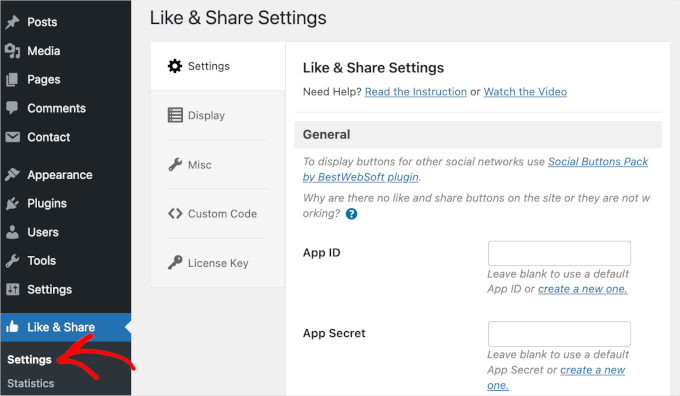
Ensuite, vous devrez ajouter un “ID d’application” et un “secret d’application” Facebook. Si vous ne disposez pas de ces informations, il vous suffit de suivre les étapes ci-dessous.
Comment créer un ID et un secret d’application Facebook ?
Dans le panneau “Réglages”, cliquez sur le lien “Créer une nouvelle” sous le champ “App ID” ou “App Secret” de l’extension “Like & Share”.
Vous accéderez ainsi au site Meta pour développeurs/développeuses. Nous vous conseillons d’ouvrir le site dans un nouvel onglet ou une nouvelle fenêtre car vous devrez ouvrir la page des Réglages Like & Share dans votre Tableau de bord WordPress pour saisir l’ID et le secret de l’application.
Sélectionné, vous devez sélectionner un type d’application. Choisissez “Business” comme type d’application et cliquez sur le bouton “Next”.
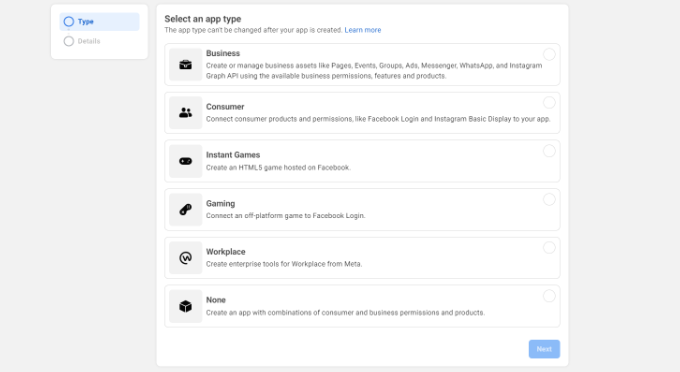
Ensuite, vous devez fournir des informations de base sur votre application.
Vous pouvez saisir un nom affiché pour votre application et vous assurer que l’adresse e-mail correcte apparaît dans le champ ” App contact e-mail “. Facebook choisira automatiquement l’adresse e-mail du compte auquel vous êtes actuellement connecté.
Il y a également une option pour choisir un compte professionnel. Vous pouvez laisser cette option sur “Aucun compte professionnel sélectionné” et cliquer sur le bouton “Créer une application”.
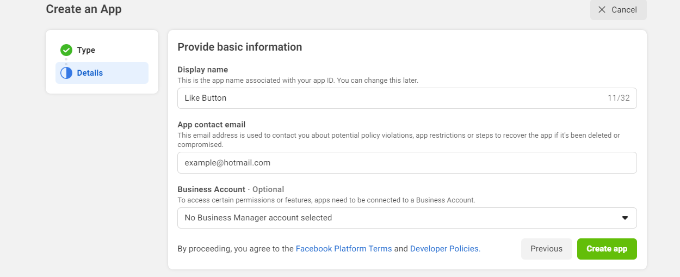
Une fenêtre contextuelle apparaît alors. Facebook vous demandera de saisir à nouveau votre mot de passe.
Il s’agit d’une mesure de sécurité visant à empêcher toute activité malveillante sur votre compte. Saisissez/saisissez le mot de passe de votre compte Facebook et cliquez sur le bouton “Envoyer”.
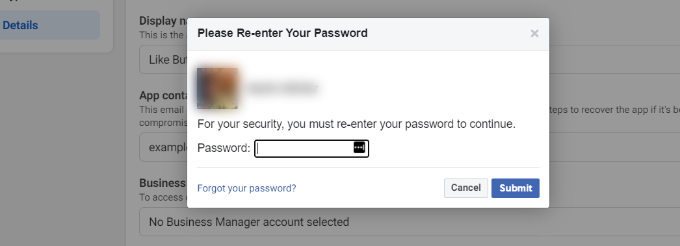
Ensuite, vous verrez le Tableau de bord de votre application.
À partir de là, vous pouvez aller dans Réglages ” Basique dans le menu de gauche.
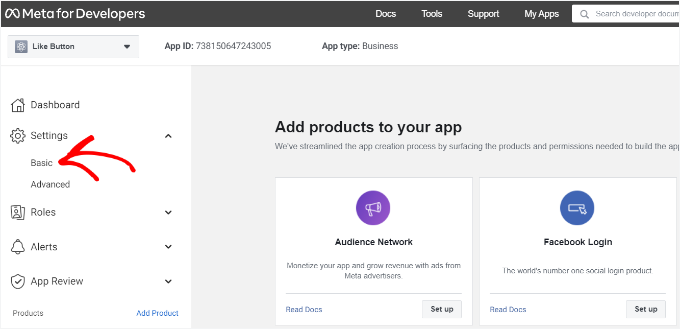
Déployez le menu déroulant “Réglages” et cliquez sur “Basique”. Consultez cette page pour connaître l'”ID de l’application” et le “secret de l’application”.
Vous pouvez désormais saisir ces informations dans les Réglages du plugin Like & Share.
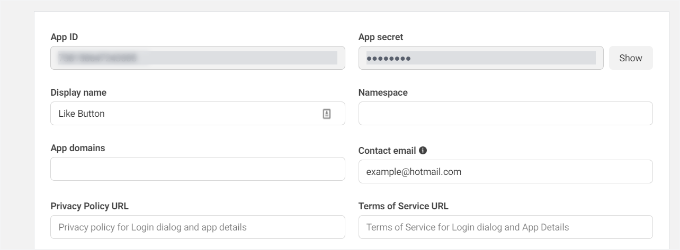
Outil de personnalisation de votre bouton “J’aime” de Facebook
Titre : Copiez l’ID de l’application et retournez dans l’onglet ou la fenêtre où se trouve la page Réglages “J’aime et je partage” . Saisissez ensuite l’ID de l’application dans le champ correspondant.
Vous devez maintenant répéter l’étape en copiant les données “App Secret” de la page Meta for Developers et en les collant dans les paramètres de l’extension Like & Share.
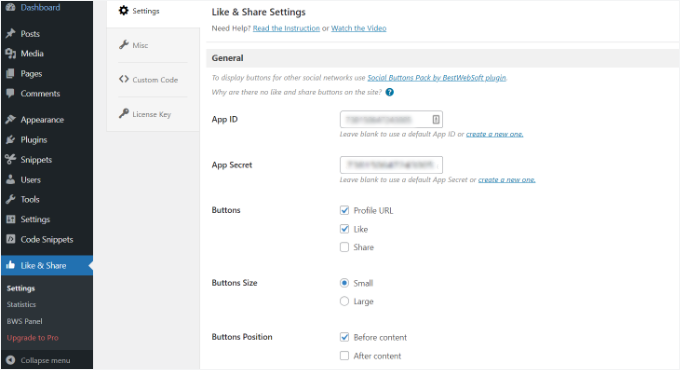
Une fois que vous avez fait cela, vous pouvez choisir d’afficher le bouton “J’aime” de Facebook en même temps que l’URL du profil et les boutons de partage.
Des réglages permettent également de modifier la taille du bouton “J’aime” de Facebook, sa position avant ou après le contenu et son alignement.
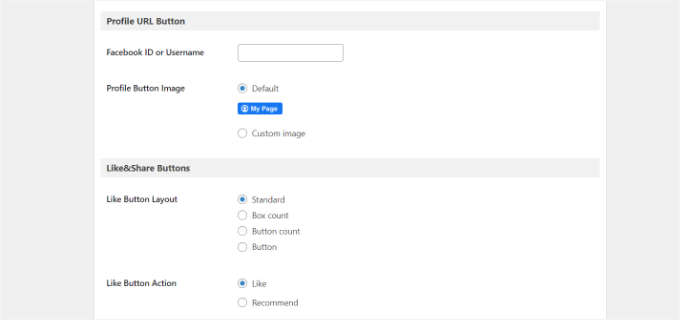
Si vous avez activé le bouton URL du profil, vous pouvez défiler jusqu’à la section “Bouton URL du profil” et saisir votre nom d’utilisateur ou votre ID Facebook.
Lorsque vous avez terminé, n’oubliez pas d’enregistrer vos modifications.
Désormais, l’extension ajoutera automatiquement un bouton “J’aime” de Facebook à votre site WordPress et le positionnera en fonction de vos Réglages.
Vous pouvez également utiliser le code court [fb_button] pour ajouter le bouton “J’aime” de Facebook n’importe où sur votre site.
C’est tout ! Vous pouvez maintenant visiter votre site et voir le bouton J’aime sur chaque publication.
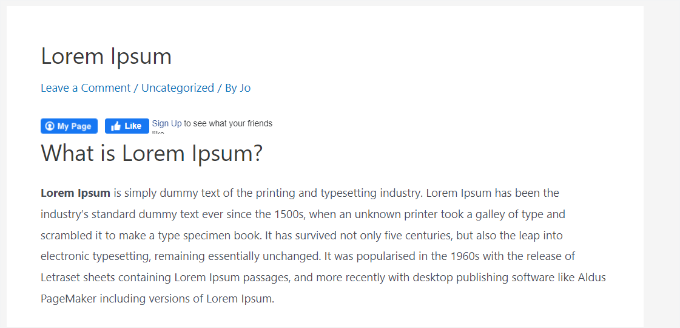
Méthode 2 : Ajouter manuellement un bouton “J’aime” de Facebook dans WordPress
Une autre façon d’ajouter un bouton ” J’aime ” de Facebook est d’utiliser du code personnalisé. Ajoutéé que cette méthode nécessite l’ajout de code directement dans WordPress, nous la recommandons uniquement pour ceux qui sont à l’aise avec la modification de code.
Dans cette section, nous allons utiliser l’extension WPCode, car elle permet à tout un chacun d’ajouter facilement du code à son blog WordPress.
Mais d’abord, vous devez visiter la page “Bouton J’aime” sur le site Meta for Developers et défiler vers le bas jusqu’à la section “Configurateur de bouton J’aime”.
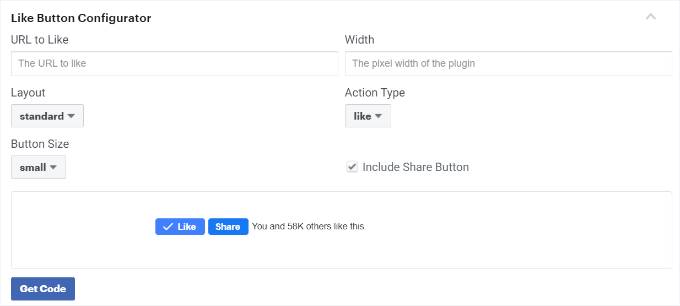
Saisissez ensuite l’URL de votre page Facebook dans le champ “URL to Like”. Cela permettra de connecter le bouton “J’aime” de Facebook à votre page.
Après cela, il suffit d’utiliser la configuration pour choisir la mise en page et la taille du bouton J’aime. Vous obtiendrez également une prévisualisation du bouton J’aime.
Une fois satisfait de la prévisualisation, cliquez sur le bouton “Obtenir le code”. Une fenêtre contextuelle s’affiche alors, affichant deux extraits de code sous l’onglet “JavaScript SDK”.
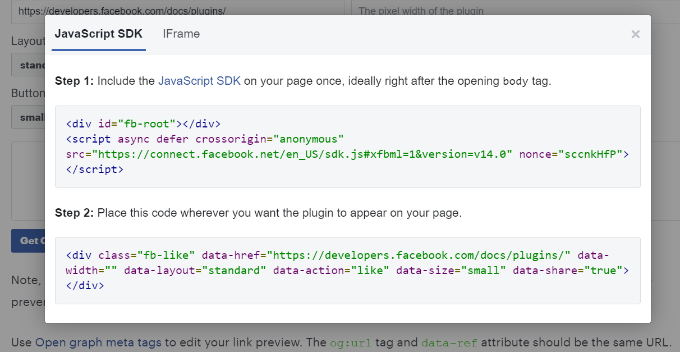
Veuillez noter que l’ajout direct de ces extraits de code à votre thème WordPress peut endommager votre site. De plus, ils seront écrasés lorsque vous mettrez le thème à jour.
C’est pourquoi nous vous recommandons d’utiliser l’extension WPCode. Cette extension vous permet de coller des extraits de code dans votre site Web et de gérer facilement le code personnalisé sans modifier les fichiers de votre thème. Cela vous aide à éviter le risque de casser votre site WordPress.
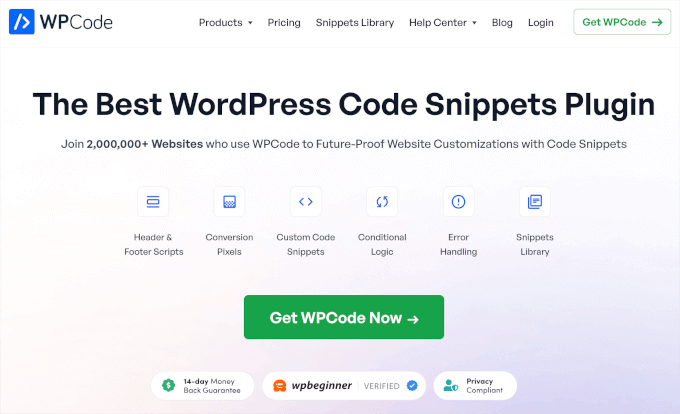
De plus, nous avons fait confiance à WPCode sur les sites de nos marques pour gérer les personnalisations de manière fluide et efficace. En savoir plus sur notre expérience, vous pouvez consulter notre avis complet sur WPCode.
Pour Premiers pas, vous devrez installer et activer l’extension gratuite WPCode. Pour plus de détails, veuillez consulter notre guide sur l ‘installation d’une extension WordPress.
Note : La version gratuite de WPCode vous permet d’ajouter des extraits de code personnalisés, ce que nous allons utiliser ici. Cependant, passer à WPCode Pro permet de déverrouiller des fonctionnalités supplémentaires, telles que l’historique complet des révisions et la possibilité de planifier votre code.
Une fois activé, vous pouvez vous rendre dans la rubrique Extraits de code ” En-tête et pied de page de votre Tableau de bord WordPress.
Ensuite, vous devrez copier le premier extrait de code et l’ajouter au fichier header.php de votre thème WordPress, juste après l’identifiant <body>. Il suffit de copier le code et de le saisir dans la section ” Body “.
Une fois cette procédure terminée, n’oubliez pas de cliquer sur le bouton “Enregistrer les modifications”.
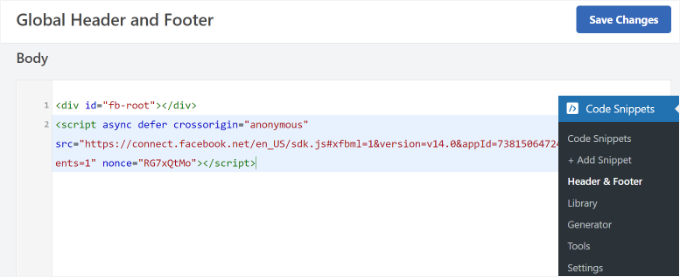
Ensuite, vous devrez copier le deuxième morceau de code et le coller dans votre site WordPress pour afficher le bouton “J’aime” de Facebook.
Pour ce faire, vous pouvez vous rendre dans ” Code Snippets ” ” + Add Snippet “ depuis votre panneau d’administration WordPress. Ou bien, cliquez simplement sur le bouton ” Ajouter nouvelle ” dans le tableau de bord de WPCode.
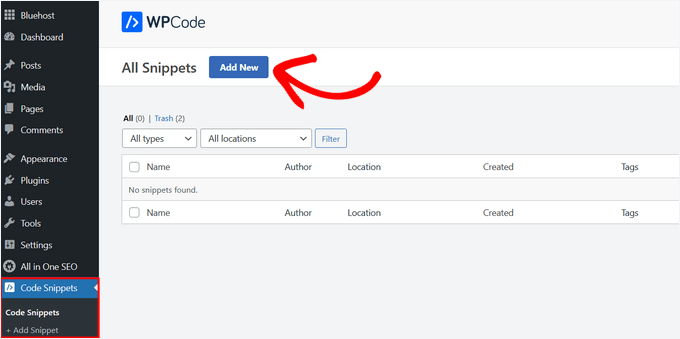
Sur l’écran suivant, WPCode vous permet de sélectionner un extrait de la bibliothèque prédéfinie ou d’ajouter un nouveau code personnalisé.
Choisissez l’option “Ajouter votre code personnalisé (nouvel extrait)” et cliquez sur le bouton “Utiliser l’extrait”.
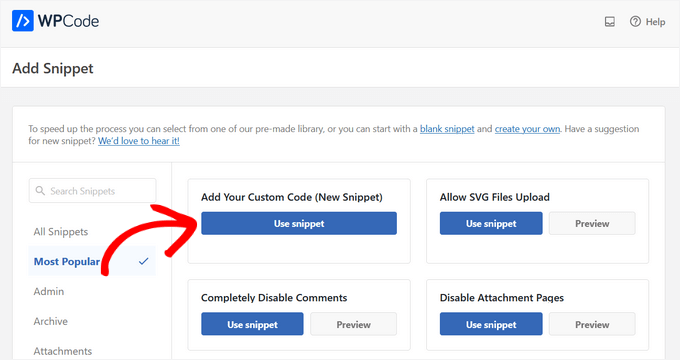
Ensuite, vous pouvez donner un nom à votre code personnalisé et saisir le deuxième extrait de code dans la section “Prévisualisation du code”.
Confirmez-vous que vous avez cliqué sur le menu déroulant “Type de code” et que vous avez sélectionné “Extrait HTML” comme type de code.
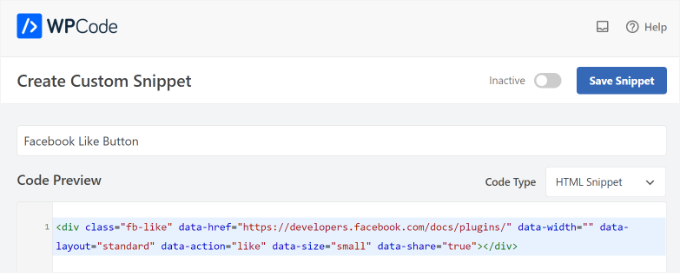
Ensuite, vous pouvez défiler jusqu’à la section “Insertion” et sélectionner l’endroit où vous souhaitez que le bouton “J’aime” de Facebook apparaisse.
Par exemple, disons que vous voulez qu’il apparaisse avant le contenu.
Il suffit de cliquer sur le menu déroulant “Emplacement” et de choisir l’option “Insérer avant le contenu” sous “Page, poste, types de publication personnalisés”.
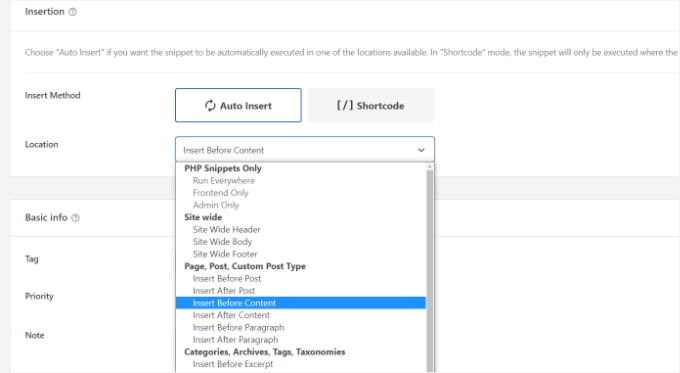
Une fois que vous avez terminé, vous pouvez cliquer sur le bouton “Enregistrer l’extrait”.
Vous devrez également cliquer sur le commutateur et le faire passer de “Inactif” à “Actif”.
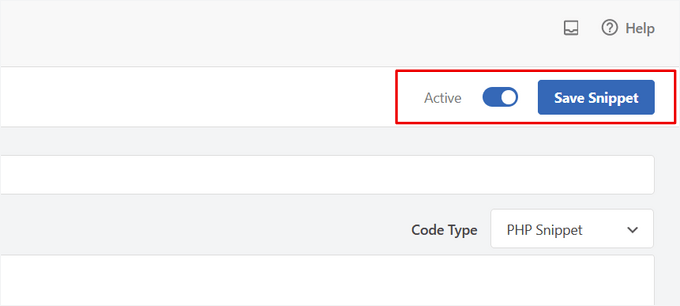
Voilà, c’est fait. Un bouton “J’aime” de Facebook apparaîtra sur votre site après que vous aurez saisi le code.
Astuce bonus : Qu’est-ce que les métadonnées Open Graph et comment les ajouter à WordPress ?
Open Graph est une métadonnée qui aide Facebook à collecter des informations sur une page ou une publication de votre site WordPress. Ces données comprennent une miniature, le titre de la publication/page, la description et l’auteur.
Facebook est assez intelligent lorsqu’il s’agit de faire remonter les champs titre et description. Toutefois, si votre publication comporte plus d’une image, elle peut parfois afficher une miniature incorrecte lorsqu’elle est partagée.
Si vous utilisez déjà l’extension All in One SEO (AIOSEO), ce problème peut être facilement corrigé.
Chez WPBeginner, nous utilisons nous-mêmes l’extension AIOSEO pour gérer les Réglages OpenGraph pour Facebook et X, entre autres efforts de référencement. Nous sommes un grand fan de ce plugin, et vous pouvez consulter notre avis complet sur AIOSEO pour plus de détails.
Pour ce faire, vous pouvez d’abord vous rendre sur All in One SEO ” Réseaux sociaux et passer à l’onglet Facebook.
Ensuite, cliquez sur le bouton “Téléverser ou sélectionner une image” pour définir une “image Facebook par défaut” si votre article n’a pas d’image Open Graph.
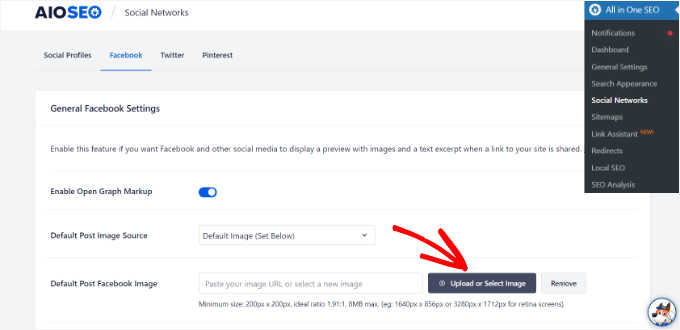
En outre, vous pouvez également configurer une image Open Graph pour chaque publication ou page.
Lorsque vous modifiez une publication, il vous suffit de défiler vers le bas jusqu’à la section Réglages AIOSEO dans l’éditeur de contenu. Ensuite, vous pouvez passer à l’onglet ” Social ” et voir un aperçu de votre miniature.
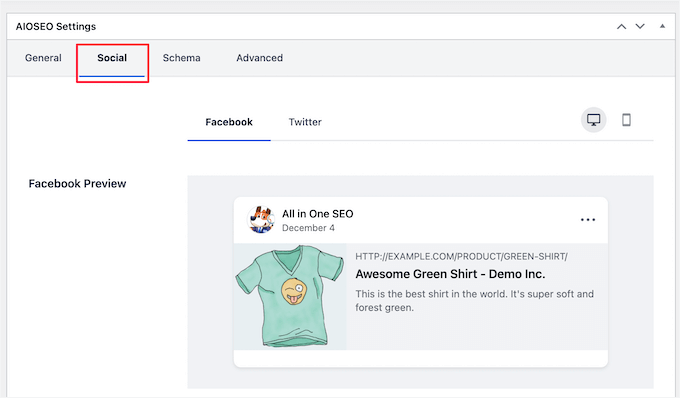
Défilez ensuite vers le bas jusqu’à l’option “Source d’image”. Ensuite, allez-y et choisissez une image open graph pour votre publication.
Par exemple, vous pouvez sélectionner “Image jointe”, “Première image dans le contenu” ou “Image personnalisée” à utiliser comme miniature de graphique ouvert.
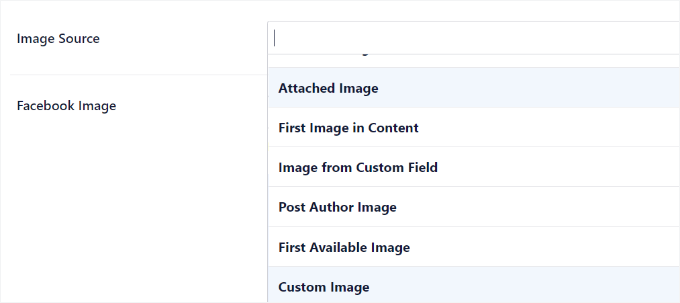
Pour plus de détails et d’autres façons d’ajouter des métadonnées open graph, n’hésitez pas à consulter notre guide sur l ‘ajout de métadonnées Facebook Open Graph dans WordPress.
Nous espérons que cet article vous a aidé à apprendre comment ajouter un bouton Facebook Like sur WordPress. Ensuite, vous pouvez également consulter notre guide sur la façon d’afficher les avis sur les pages Facebook dans WordPress ou nos choix d’experts sur les meilleures extensions de réseaux sociaux pour WordPress.
Si vous avez aimé cet article, veuillez alors vous abonner à notre chaîne YouTube pour obtenir des tutoriels vidéo sur WordPress. Vous pouvez également nous trouver sur Twitter et Facebook.





Vishwas anand
This is my single.php file. Please tell me where to add the code.
” . __( ‘Next’, ‘twentyfifteen’ ) . ‘ ‘ .
” . __( ‘Next post:’, ‘twentyfifteen’ ) . ‘ ‘ .
‘%title’,
‘prev_text’ => ” . __( ‘Previous’, ‘twentyfifteen’ ) . ‘ ‘ .
” . __( ‘Previous post:’, ‘twentyfifteen’ ) . ‘ ‘ .
‘%title’,
) );
1
// End the loop.
endwhile;
?>
j.siurivera
Thanks so much for the tutorial! However I couldn’t seem to get the Like button to show up on post.
I’ve been pasting the iframe code in between
and (iframe code paste here)
and some other locations before the end loop but still not coming out. Please help!
Here’s the single.php file for my theme (Eryn)
Thank you!!
j.siurivera
Sorry just realized the php didn’t come out… here it is:
xuamox
Works but it is not responsive. Are there any other options for a responsive design?
Manu Raj
Thank you
Santiago
I get an Error 404 page when i use the share button. Can you help me please?
Rebecca
Thank you to the people who asked ‘the dumb questions.’ The answers helped me sooo much. Very happy! Thanks guys.
cathal butler
Can’t get code to work…..below is copy of code from me single.php page. Where should the code be pasted
#content{margin-left:18px;}
<div class="post" id="post-“>
<?php the_content('Read the rest of this entry »’); ?>
‘Pages: ‘, ‘after’ => ”, ‘next_or_number’ => ‘number’)); ?>
<?php the_tags( 'Tags: ‘, ‘, ‘, ”); ?>
WPBeginner Support
just above or below the_content() line.
Admin
Emmeline Jane
Hi!
I’m currently tying to get the facebook insights to work through your code and plugin, however I can’t for the life of me figure out how to put this ‘proper’ facebook like code in…..!!
This is the code for my ‘singular.php’.. the theme I’m using is Hatch.
<div id="post-” class=””>
<?php echo apply_atomic_shortcode( 'byline', '’ . __( ‘By [entry-author] on [entry-published] [entry-edit-link before=” | “]’, ‘hatch’ ) . ” ); ?>
<?php the_content( __( 'Continue reading →’, ‘hatch’ ) ); ?>
” . __( ‘Pages:’, ‘hatch’ ), ‘after’ => ” ) ); ?>
Please let me know where to put the code! I’ve tried it every where, around the ( have_posts) etc…
WPBeginner Support
Try putting the code between post title and the_content.
Admin
Amy
How do I add a facebook “like my page” button on my posts? I saw the configuration and I have the two codes but I have no idea about Javascript, etc?? Thanks!!
Karen
Hi thanks for the tutorial! I got it to work on my site but for some reason when I “like” a post it doesn’t show up in my FB feed. Any idea if I did something wrong?
Editorial Staff
Sometimes if you excessively like posts from one site, then FB tends to temporarily block it. On the other hand, look in your activity feed to see if it is going there.
Admin
Juvy
Hi, WPBeginner,
Can I ask your help. I am new of WordPress. I have a big problem on my website. Please help me how to resolve. I’m begging you. This is my website http://www.mymovietube.com and it was broken.
This is the error I received:
Parse error: syntax error, unexpected ‘<' in /home/mymovie/public_html/wp-content/plugins/facebook-social-plugins/widgets/like-button.php on line 2
Please let me know how to fix this.
Thank you.
Need Help,
Juvy
Editorial Staff
You need to look at this article:
https://www.wpbeginner.com/beginners-guide/beginners-guide-to-pasting-snippets-from-the-web-into-wordpress/
Admin
Michael
Is Facebook Insigts also working with the html5 version of the like button or just with the xfbml version? Both versions are working with the same javascript.
Great article by the way. I’m going to implement that into my website. Thanks.
Editorial Staff
It should work with the HTML5 version as well.
Admin
Jake
I was wondering if you could tell me how to customize the image and description that shows on Facebook when you like the site or possibly point me to a article that discusses this, I am having the hardest time trying to figure that part out. Thanks!
Editorial Staff
Use the WordPress SEO by Yoast plugin. It adds og: (Open Graph) tags in your theme. The meta description you specify for your post will then end up being the description. The post thumbnail you attach will end up functioning as the thumbnail. Hope this helps.
Admin
Jake
YES!!! This site rocks!!
garrick1234
Where does one find the single.php file? Sorry I know that sounds pretty dumb, but I am (sometimes)
wpbeginner
@garrick1234 No such thing as a dumb question. You will find it in your FTP folder /wp-content/themes/yourthemename/Or in your WP-Admin go to Appearance > Editor and find it there.
Ginger
How can you enable users to add their own comments to their recommendation at the time of posting?
wpbeginner
When the user clicks, a comment box should just open. Specially if you are using the FBML version.
angie
thank you for the layout=”button_count”!!! i’ve been looking for that everywhere!
Editorial Staff
Hey,
Use WordPress SEO by Yoast and enable the social section. Or just install and activate Simple Facebook Connect… don’t have to do anything else, and it will work.
Admin
tingmike
Thanks. One problem that I have is that the button doesn’t align with the Google+ and Pinterest buttons. It’s just two pixels too low compared to the other buttons. Any idea how to make them align to the same horizontal alignment?
wpbeginner
@tingmike You can add CSS classes to make sure that it works.
Sophia
Thanks this is brilliant!
Fran Dorf
Where do I find the “post loop” in the single.php file? I’ve tried pasting your code in various places and nothing happens!!!
Editorial Staff
Post loop is the code which says while have posts, the post etc. You want to post this code before the endwhile;
Admin
wpbeginner
@Fran Dorf You have to look at while have_post, the_post
Kate
While these instructions appear straightforward, they are of no use to someone who does not know how to “open your single.php file in your theme’s folder.” While I am on the internet all the time, I have next to zero knowledge of html. I have added code before, but I need instructions on how to get to the code in the first place. I cannot find anything anywhere on wordpress about a “single.php” file. Please help. I really want readers to be able to share my posts on Facebook, Twitter, and through e-mail.
wpbeginner
If you are unaware of how to open your single.php file, then perhaps you should utilize one of the many free plugins that add a facebook like button to your site.
Tierney
Hi, I posted the code on my site and it worked. However, the friend icon is not staying. When i refresh the page, the friend icon disappears. I want all of the friend that clicked the like button to remain so I would know who clicked the like button. I need their names for the prize drawing. Can you help? Here is my code:<iframe src="http://www.facebook.com/plugins/like.php?href=ID)); ?>&layout=standard&show_faces=true;width=450&action=like&colorscheme=light” scrolling=”no” frameborder=”20″ allowTransparency=”true” style=”border:none; overflow:hidden; width:450px; height:60px”>
Tierney
sorry. I tried posting my code but showed up as that WP beginner. My apologies
wpbeginner
your code is right… it seems like that its some sort of FB glitch that its not recording your likes.
Megan at Fiterature
Hi – this is not working for me. I copy and pasted exactly what is above into my single.php section. I am using the Twenty Eleven theme. When I Update File and then check my website…no Like button. What am I missing?
papayacansada
I’ve been having some headaches with this thing, all I want is a facebook like button on the homepage, I got that but the problem is that when the button is clicked it will like the most recent post and not the main page, after many attempts at the moment I have the code outside the loop, in the header so it displays pretty much everywhere, it seems that even this way when I’m on a single page the button work as supposed and likes go to the single post, my concern is the main page, I need it to like mydomain.com and not the latest post when I’m on the homepage.
wpbeginner
@papayacansada where it says href in the code. Replace the php code with your site domain.
jenniferdoser
This worked great – thanks! I’m just having 3 issues. (1) When I like a post, it shows the following text next to the thumbnail:You may use these HTML tags and attributes: (2) I would like to have the comment box drop down when someone clicks the like button, as it does on this site and I can’t seem to find any documentation on that.
(3) I tried to access insights after installing the Open Graph plugin, but I get this error message when I try to add insights for the blog:No admin data found at root webpage http://www.firelilyphotography.com/. Insights requires admin data at this root webpage for the specified URL http://www.firelilyphotography.com/blogWhat admin data do I have to add for insights to work?
Thank you!
wpbeginner
@jenniferdoser Ok first, you need to follow the XFBML way if you want insights, and the dropdown message box on the like buttons.Then follow this tutorial:https://www.wpbeginner.com/wp-tutorials/how-to-get-facebook-insights-for-your-wordpress-site/
jenniferdoser
I’m using the XFBML way and I’m still not quite there. I think the main issue is that when I first activated the plugin, I used my business page Facebook ID instead of my personal ID. I’ve since updated the ID, but I still get an error when I like a post:The app ID “73464248836” specified within the “fb:app_id” meta tag was invalid.This is my business page ID. I tried deleting the plugin and starting from scratch, but that’s not working. How can I get WP to recognize the new ID?
robolist
@wpbeginner thanks for that For some reason i was thinking it wouldnt work. My college placed the codes for share buttons there before but when clicked they would ‘like’ all of the posts together. Maybe he didnt use the get_permalink function. Although i am sure i told him to use it. but it is working now so thank you so much…
For some reason i was thinking it wouldnt work. My college placed the codes for share buttons there before but when clicked they would ‘like’ all of the posts together. Maybe he didnt use the get_permalink function. Although i am sure i told him to use it. but it is working now so thank you so much…
kellydiek
Are you aware of a plugin or even the possibility for this… you have a blog post with the like button on it. Currently has 15 ‘likes’. Let’s say you edit your blog post with updated information. Can you force facebook to repost the blog link to the wall of the users who already ‘liked’ the post previously? (So they know it’s been updated). Hope that makes sense. Requested by a client today and I’ve never heard of such a thing!
wpbeginner
@robolist Are you using a theme framework?? If not then it shouldn’t be very hard. Place the code above inside your loop on the index.php or loop.php or your archive.php file…
robolist
Fantastic tutorial guys… Just like all of your tutorials throughout this website, they are all very easy to follow. Great stuff
I have been developing a new blog for some time now and am working on a customised theme. We have placed several social share buttons on each post very similar to how you have suggested here. I chose to do it manually rather than using a plugin because i dont seem to be able to get exactly what i want from the plugins whether it be the correct share buttons i want or the lack of styling options with the plugin.
Placing the buttons manually allow me to use what i want and style them how i want. The only problem is, for the life of me i just cant figure out how to get the buttons to appear in the loop with the excerpt.
I would be extremely grateful if you could point me in the right direction.
Many thanks in advance.
filipstrbad
when i add the code to single.php it only shows the like button on the new posts and not the old ones. can i add it to the old ones too?
wpbeginner
@JustinElia This tutorial is for adding the like button for each WordPress post… if you want it to link to your facebook page, then simply change the href to facebook.com/yourfanpage
JustinElia
This may be a very stupid question. I am using like buttons on my site and have tried various plugins and everything,however, how does one link the facebook like button with your page on your posts? Example : I go to like a certain post on facebook on my site and it says “So and So liked http://www.bigbackpacker.com post about blah blah blah” It doesn’t link to my facebook page for my blog. I hope this isn’t too confusing and any help would be appreciated, thank you.
ssfutrell
I uploaded the facebook like button plugin. It is on the bottom of my posts. I want it at the top of all posts. How do I change it to be at the top of post. Can’t figure that out. I hope that you haven’t answered already. I need very plain instruction. Thanks.
wpbeginner
@seocatalysts Use the facebook like box plugin…
seocatalysts
Thanks for inform me about how to add like facebook button? and I did it but still My confusion is that how can i show that how many people like my blog? For this problem solve any script available….Any help would be appreciate…..
SeviGadeaGimenez
I like to ask you how i can do to center the like button, i mean that i have the button at the left of the page but i’d like to have it on the center.
thanks for all, and forgive my poor english
wpbeginner
@debbie.mccormick You can only paste functions in your custom-functions.php files…
If you notice in our directions we suggested that you paste it in your single.php file. However, I understand that you are probably using a child theme for thesis that is why you don’t have access to single.php file.
You need to run this code as a function. Or use a plugin.
debbie.mccormick
HELP I just put this code in my custom PHP folder and now my blog is gone.
I get this message:
Parse error: syntax error, unexpected ‘<‘ in /home/debmcc4/mccormickmadness.com/wp-content/themes/thesis_181/custom/custom_functions.php on line 118
I copied and pasted it right in so I can’t see how I could have put anything in incorrect. Please help me!!
wpbeginner
If you follow our article about how to add open graph meta data, then it asks you to link your facebook account with your site. Then you will go to:
http://facebook.com/insights << There you can add your website. If your account is listed as it should, then it will show you all sort of cool insights about your site.
kiendlam
How exactly do you see who actually clicked on the Like button. It usually shows one or two names and then a number, but I can’t seem to click anywhere to see who has liked the post. Can you help? Thanks.
mrahmadawais
lol
wpbeginner
@infinitywealth.carmen yes… u cannot install any plugin on the free WordPress.com site.
infinitywealth.carmen
@wpbeginner what about smart sharing plug in? still need self-hosted wordpress?
wpbeginner
@infinitywealth.carmen Nope.
infinitywealth.carmen
So there’s no way to add FB like box in the free version of wordpress? I have tried to add both types to a html widget but it won’t work
wpbeginner
@anthony_garcia Use the plugin that we recommend in this article. Facebook Open Graph Meta Data. That will fix the issue.
anthony_garcia
how do you adjust the picture associated with the post when the Like button is clicked? I have a Twitter icon on my sidebar that keeps getting picked up as the picture for the post. Example: http://www.anthonyjgarcia.com/social-music-engagement-turntablefm
using xfbml on self hosted wordpress. THANKS!
kaniayubu
For some reason I have been unable to get the XFBML version of this code to work. The iframe version works perfectly but as you mentioned in your other post, the send button doesn’t work in the iframe version. Could there be any additional steps to get the xfbml version of it working. I don’t even see a Facebook like icon when I use the xfbml code. Any help would be greatly appreciated. Thanks.
wpbeginner
@artist74 No need to do anything else. It will be like that for all your posts.
artist74
Many thanks for your incredibly speedy reply. I had to play around a bit and now it’s working for me (bottom of the post on my blog).
Will this now be as default (so for every post, this is what I want) or do I need to add anything else?
Many thanks.